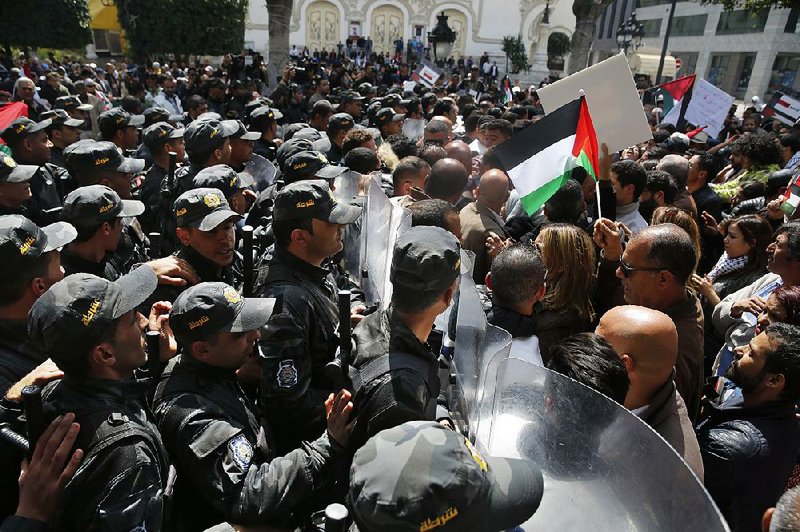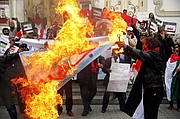TUNIS, Tunisia -- The Arab League on Sunday rejected the U.S. recognition of Israeli control over the Golan Heights.
Arab leaders at the bloc's annual summit also reiterated their commitment to resolving the conflict based on the Arab Peace Initiative of 2002. Under that deal, they would recognize Israel in return for Israel's full withdrawal from the Golan Heights as well as east Jerusalem and the West Bank, lands occupied in the 1967 war.
This year's Arab League summit, held in Tunisia, comes against a backdrop of ongoing wars in Syria and Yemen, rival authorities in Libya and a lingering boycott of Qatar by four fellow league members.
Algeria's President Abdelaziz Bouteflika and Sudan's President Omar al-Bashir skipped the meeting as they contend with mass protests against their long reigns. Syria, a founding member, was expelled in 2011 during the early days of the uprising against President Bashar Assad.
Representatives from the 22-member league -- minus Syria -- jointly condemned President Donald Trump's recognition of Israel's annexation of the Golan Heights and his decision last year to recognize Jerusalem as Israel's capital, arguing that his administration is unfairly biased toward Israel.
In their final statement after the daylong summit, the leaders affirmed that the Golan Heights, a strategic plateau once used to shell northern Israel, is "Syria's occupied territory."
At the opening of the summit, Saudi Arabia King Salman said his nation "absolutely rejects any measures undermining Syria's sovereignty over the Golan Heights" and supports the creation of a Palestinian state in the West Bank and the Gaza Strip, with east Jerusalem as its capital.
He added that Iran's meddling was to blame for instability in the region. Saudi Arabia and Iran are locked in proxy wars in Yemen and Syria, and back opposing groups in Lebanon, Bahrain and Iraq.
Calling the meeting "the summit of resolve and solidarity," Tunisia President Beji Caid Essebsi decried "regional and international interventions" in Arab affairs.
Arab League Secretary-General Ahmed Aboul-Gheit said Iran and Turkey have "worsened some crises and created new problems," calling on Arab leaders to "unite as one force under one umbrella against the regional interventions."
One of the few things that has united the Arab League over the past 50 years is the rejection of Israel's occupation of the Golan Heights as well as east Jerusalem and the West Bank, territories that the Palestinians want for their future state.
The international community, including the United States, largely shared that position until Trump upended decades of U.S. policy by moving the American Embassy to Jerusalem last year and recognizing Israel's 1981 annexation of the Golan Heights last month. U.S. officials say both moves recognize reality on the ground and contribute to Israel's security.
The Arab leaders meeting in Tunisia condemned those policies but did not announce any further action.
That's in part because regional powerhouses Saudi Arabia and the United Arab Emirates have cultivated close ties with the Trump administration, viewing it as a key ally against their main rival, Iran. Both face Western pressure over their devastating three-year war with Yemen's Houthi rebels, and Riyadh is still grappling with the fallout from the killing of Washington Post columnist Jamal Khashoggi by Saudi agents last year.
In Syria, small protests against Trump's Golan Heights move were held and state media criticized the Arab summit.
"The Golan is not awaiting support from the Arabs, and not a statement to condemn what Trump has done," the Thawra newspaper said in an editorial that accused Arab leaders of taking their orders from the U.S. and Israel.
U.N. Secretary-General Antonio Guterres attended Sunday's meeting, along with EU foreign policy chief Federica Mogherini and African Union Commission chairman Moussa Faki.
Guterres reiterated international support for an Israeli state and a Palestinian state "living side by side in peace within secure and recognized borders, and with Jerusalem as capital of both states."
"There is no Plan B: without two states, there is no solution," he said.
Information for this article was contributed by Sarah El Deeb of The Associated Press.
A Section on 04/01/2019

